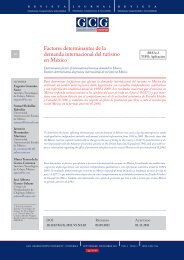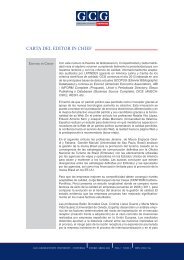Vol. 6 Num. 1 - GCG: Revista de Globalización, Competitividad y ...
Vol. 6 Num. 1 - GCG: Revista de Globalización, Competitividad y ...
Vol. 6 Num. 1 - GCG: Revista de Globalización, Competitividad y ...
Create successful ePaper yourself
Turn your PDF publications into a flip-book with our unique Google optimized e-Paper software.
Clemente Hernán<strong>de</strong>z-Rodríguez & Raúl Francisco Montalvo-CorzoThere is the possibility that newcomers to the cluster will be non-competitive, and thatthey will not have the benefits obtained by the pioneers such as cost reduction, specializedinfrastructure, and institutional support (Barkley, 2001). If there is no previous study or well<strong>de</strong>signedplan of action, the entrepreneurs can lose interest and withdraw their participation,and thus this action discourages possible actors to get into the cluster project (Morales,2007). Therefore, clusters may discourage investment in innovation. Incorrect spatial andcommercial planning can cause the affiliates of the cluster to lose industrial feasibility anddamage its components. The lack of studies and projects can make the planning of aneconomic cluster less attractive, constraining the quantity of entrepreneurial nuclei thatbelong to it.653. Cluster policies in China and MexicoIndustrial policy is interested in economic structure, which is in turn concerned with productionmo<strong>de</strong>ls in different sectors, implying that it is related to adjustment measures, bothdirectly and indirectly promoting and slowing at the micro or macro levels 1 . Normally, industrialpolicy will be linked to income, sectoral policies, and regulations (Katzenstein, 1985;Eaton and Grossman, 1986). Industrial policy usually involves coordinated efforts betweenthe public and private sectors to <strong>de</strong>velop new technologies and industries. For instance, governmentsprovi<strong>de</strong> financial support and capital to private sectors by direct subsidies, fiscalrebates, or credit of state-owned banks.The aim of industrial policy is to influence (or foster) competitiveness and to reach economicpolicy objectives such as promoting employment, investment, growth, or balance with theforeign sector (Hernán<strong>de</strong>z, 2010). Industrial policy emphasizes cooperation between governments,banks, private firms, and workers to enhance the national economy. It is in thisfavorable economic environment that cluster policies are connected to industrial policy. Thecluster policy is important to support national and regional economic <strong>de</strong>velopment policies(Asheim, Cooke and Martin, 2008; Sölvell, Lindqvist, and Ketels, 2003).This research compares the effects of business and industrial clusters in the People’s Republicof China (PRC) and Mexico. Before presenting the cluster outcomes, we present theprofile of each country regarding business clusters.The cluster concept has been addressed and used in different ways to explain economic<strong>de</strong>velopment processes. Clusters have gained popularity and nowadays are consi<strong>de</strong>red keydrivers of economic <strong>de</strong>velopment, innovation, and competitiveness. In the following paragraphs,we will discuss information concerning the clusters and their supporting institutionsin the cases of China and Mexico.1. Historically, the term “industrial policy” has been associated with some <strong>de</strong>gree of indicative or economic planning, though this is not the connotationin this research. Governmental involvement in business planning is suspiciously watched from the liberal si<strong>de</strong>. Critics of industrial policyclaim that governments can do nothing to improve things better than can the market forces related to choosing winners, and that such misgui<strong>de</strong><strong>de</strong>fforts can worsen the state of things.<strong>GCG</strong> GEORGETOWN UNIVERSITY - UNIVERSIA ENERO-ABRIL 2012 VOL. 6 NUM. 1 ISSN: 1988-7116pp: 55-90















